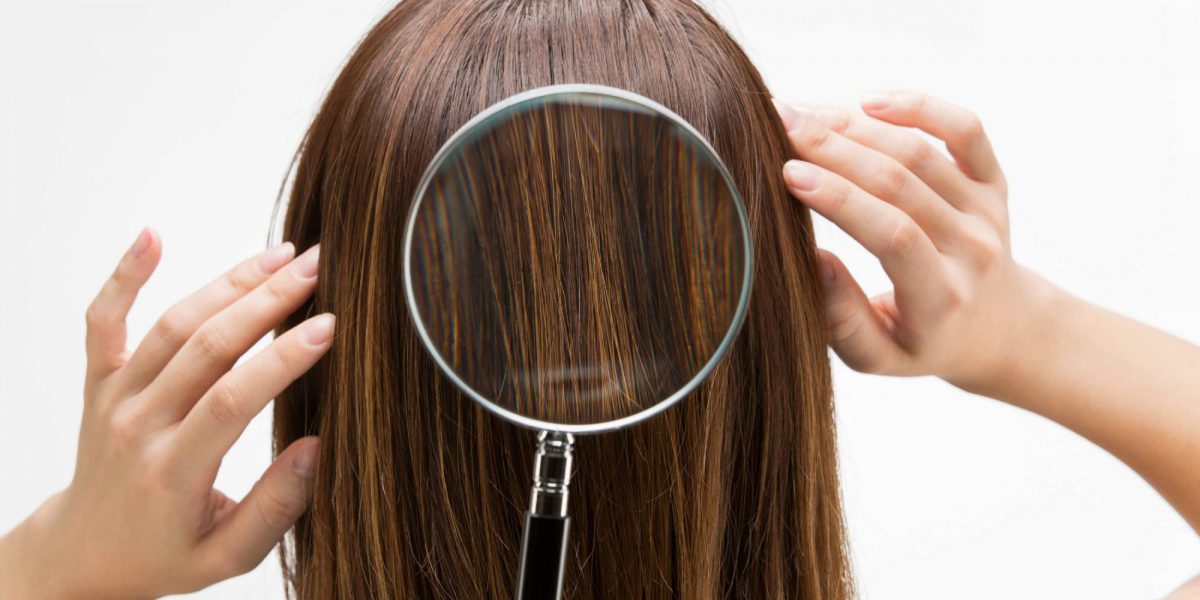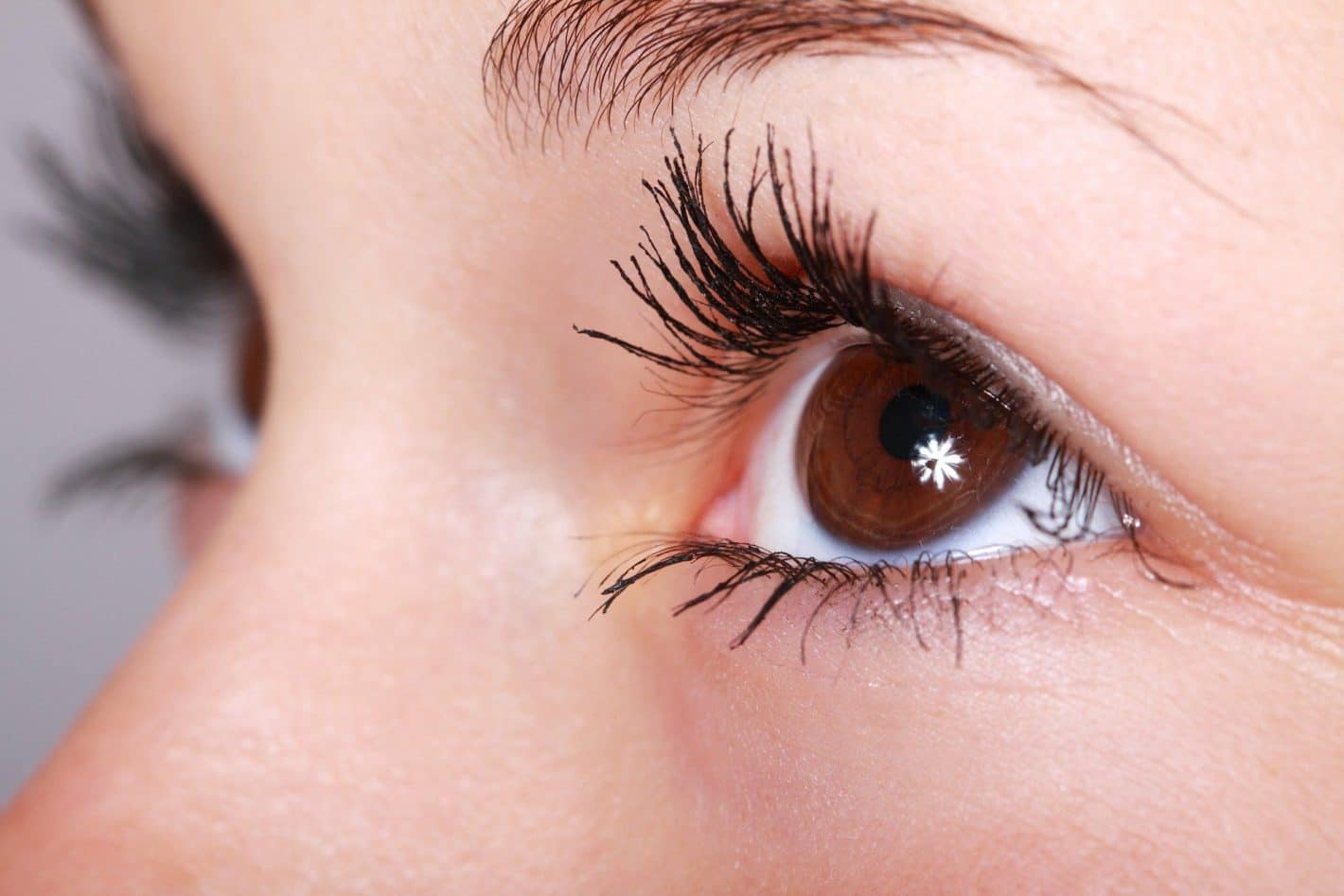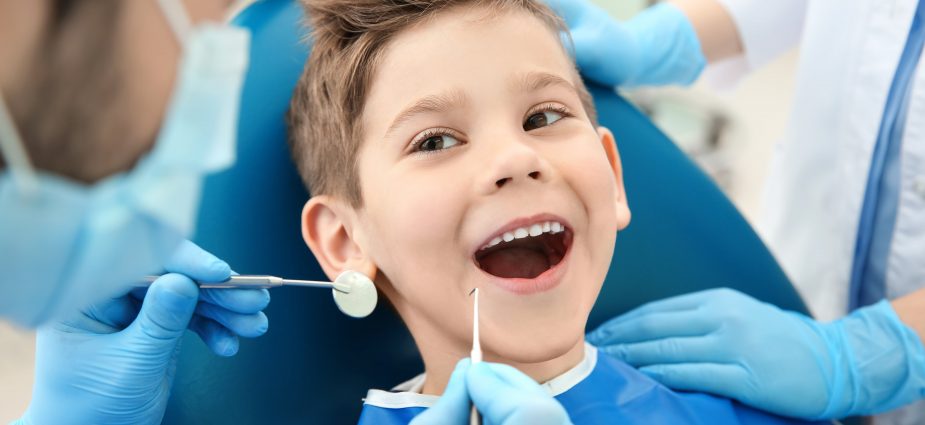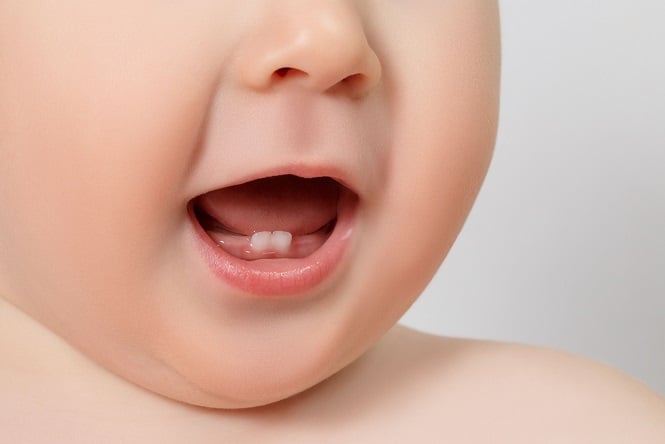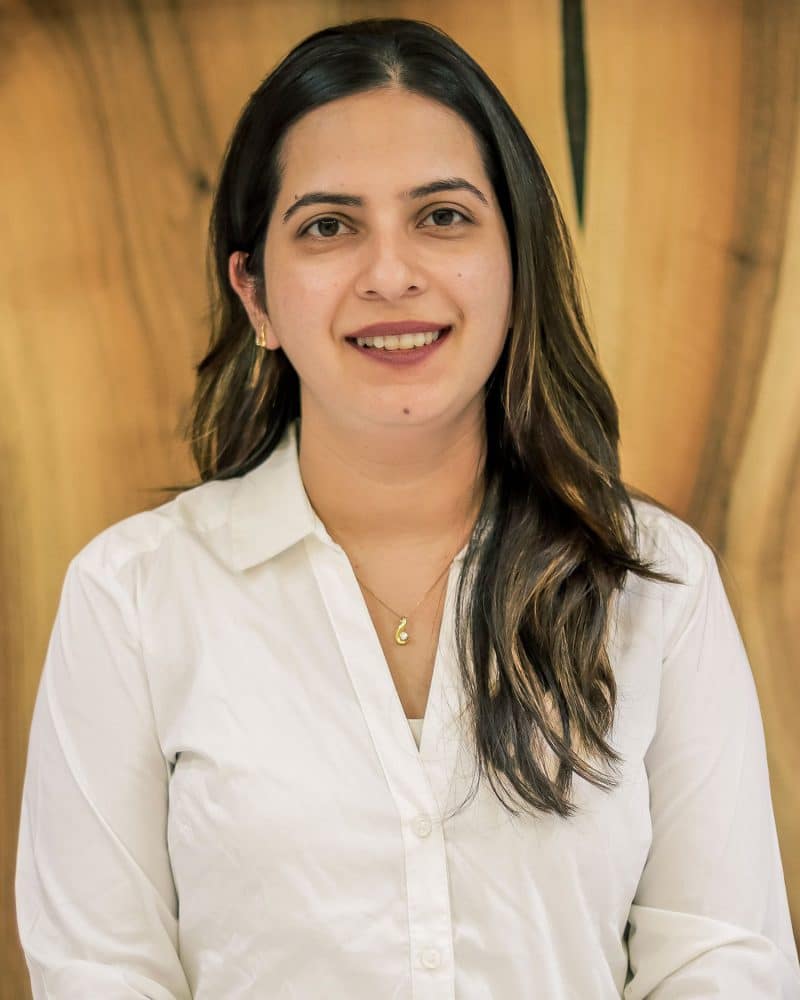Teething can be a challenging time for both babies and parents, but with patience and understanding it can be manageable. In this blog, we’ll discuss the signs that your baby is teething, in what order the baby teeth arrive, how to take care of your baby’s teeth, and when to see the dentist.
At What Age Do Babies Start Teething?
The first teeth often emerge between 6 and 12 months of age, though in some cases the teeth may appear earlier or later. The most common sign is painful gums which you can identify by observing your baby closely for any chewing activity like gnawing on fists/digits; drooling when they are feeling uncomfortable but not enough to cause havoc with other bodily functions (such as sleeping), fussiness during mealtimes, because this means one thing – teething!
When Does Teething End?
The duration of the teething process can vary. At some point between your child’s second and third birthdays, however, your child will have a full set of 20 primary teeth! This means that throughout these two years there will be many changes happening with their mouth – including soreness due to new arrivals pushing through.
What Are The Signs And Symptoms Of Teething In Babies?
The symptoms of teething can start as early as three to four days before your child’s first teeth come through the gums, or they may not show any signs at all! Some signs of teething in babies are:
- Irritability
- Drooling more than normal
- Biting or chewing on things
- Sore and swollen gums
- Disturbed sleep
If you notice any of these signs, be sure to pay attention because it could mean that your baby is about ready for their first tooth! However, if your baby suffers from fever, rash, or diarrhea, during this period, then contact a Pediatrician or a Pediatric Dentist.
In What Order Do Baby Teeth Arrive?
The process of tooth development can be a little different for every child, but here’s what you might expect:
- The central incisors (the front teeth) come in first. Usually the bottom pair arrives first, then the top pair.
- Then the lateral incisors (the teeth next to the central incisors) arrive.
- The first molars (the back teeth that grind food) come in after the lateral incisors.
- The canine teeth (the teeth on either side of the lateral incisors) arrive next.
- Finally, the second molars (the teeth in the very back of the mouth) arrive last.
What If Teething Starts Late?
It’s important to remember that teeth come in when they want and not before. If your baby’s teething starts later than average, don’t worry! All babies are different and grow at their own pace. While the first tooth normally appears between 6 to 12 months, it is possible for the tooth to appear as early as 3 to 4 months or as late as 13 to 14 months. If it takes longer than that for the first baby tooth to erupt, it can be considered to be an atypical tooth eruption and calls for expert intervention.
If you are concerned about your baby’s developmental progress, then you can consult our pediatric dentist, Dr. Pratibha Kukreja of Pandit Clinic, Dentistry for children, teens, and special needs. The dentist will be able to determine if the delayed eruption of teeth is a cause for concern or if it is appropriate for your baby.
How Do You Soothe Your Baby During The Teething Period?
Teething can be a real pain for babies, and there’s no one-size-fits-all solution to solving your child’s discomfort. Dr. Pratibha says that there’s no magic technique which works every time, so you may want to try different things until something helps your little one feel better! Here are some things you can do to soothe your baby during this time:
- Give your baby teething toys: Chewing on these toys provides counter-pressure and relieves the pain your baby may be feeling. Your baby may not enjoy it at first because it hurts, but this is often their best natural remedy when teething pain sets in - just give them some time! However, the use of these toys is recommended only under adult supervision. Avoid very small or breakable toys.
- Apply cold temperature: During the teething period, your baby’s gums often become inflamed and sore. Applying refrigerated teething toys and even a cold spoon can relieve your baby’s sore gums.
- Extra cuddles: Oftentimes simply hugging and snuggling can help your baby feel better.
If the pain does seem unbearable to your baby, talk to the pediatric dentist about possible solutions to relieve pain/fever.
How Can Regularly Visiting The Dentist Help During This Period?
Generally, it is recommended to visit the pediatric dentist when your baby’s first tooth erupts or when your baby reaches 12 months of age. Sometimes, if you are concerned about your baby’s development, you may visit the dentist before that. Either way, regularly visiting the pediatric dentist is crucial for your baby’s teeth, mouth, and gums. The dentist can monitor the development of the baby teeth and ensure that there are no problems. The pediatric dentist can prescribe pain relievers if your baby is suffering through too much pain and discomfort. The pediatric dentist can also give you some tips on taking care of your baby’s teeth.
How To Take Care Of Baby Teeth?
The dental health of your child starts with their teeth! Baby teeth have to last for several years before they’re replaced by adult ones. Establishing good oral hygiene habits early will help set your child up for a lifetime full of healthy gums and teeth. The earlier you start caring for your baby’s teeth, the more likely it is that they will have good dental hygiene habits throughout their life.
Here are a few things you need to do to take care of your baby’s teeth:
- Brush your baby’s teeth: We all know how important brushing is to maintaining good oral health. Carefully brush your baby’s teeth with a baby toothbrush and a smear of toothpaste at least twice a day and after your baby has eaten anything sugary. Once your baby becomes 2 years old, slightly increase the amount of toothpaste and teach your baby how to rinse and spit the toothpaste.
- Monitor your baby’s diet: Avoid giving your baby any sugary and sticky snacks like caramel or toffees. Don't let your baby fall asleep with a bottle or sippy cup of milk, formula and other sweet drinks as this can lead to dental problems like tooth decay and cavities.
- Regular dental checkups: Take your baby to the pediatric dentist as soon as the first tooth erupts or once your baby is 12 months old. The dentist will monitor your baby’s oral health and development and make sure that there are no problems. If by chance dental problems do occur, the dentist will be able to take care of them before they cause lasting damage.
If you have concerns about your baby’s oral health, or if your baby is showing signs of teething, contact Dr. Pratibha Kukreja Pandit, the expert pediatric dentist at Pandit Clinic, Dentistry for children, teens, and special needs, Pune.
Virtual Video Consultations
100% SAFE AND SECURE CALLS WITH ENCRYPTION. YOUR PRIVACY AND CONFIDENTIALITY IS GUARANTEED.
Start here, by making an appointment for a virtual consultation with our expert Dr. Pratibha Kukreja Pandit (NEW PATIENTS ONLY).
Dr. Pratibha Kukreja Pandit is available for Virtual Video Consultations from Monday – Saturday between the hours of 11 am – 2pm and 4pm – 7pm.
If you are already our valued patient with questions or have an emergency please contact the clinic on +91 9822053446
Consult Dr. Pratibha Kukreja Pandit
(Pediatric Dentist)
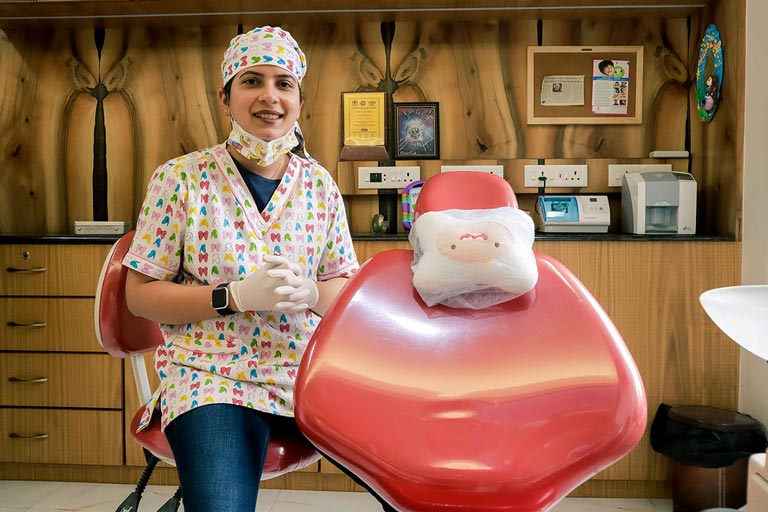
Virtual Video Consultation Fees Rs. 500
The Consultation Fees Must Be Paid Online by GOOGLE PAY BEFORE YOUR APPOINTMENT. See The Instructions On Appointment Confirmations
Your virtual video consultation includes:
- Discussion of problems that your child is facing like tooth pain, swelling or any other emergencies
- Dr. Pratibha will recommend a course of treatment or medications for your child.
Meet the Doctor
Pediatric and Preventive Dentistry Specialist
Dr. Pratibha is the Chief Dentist at Pandit Clinic. She is also a Consultant Pediatric Dentist at Kotbagi Hospital and KEM Hospital, Pune.
Dr. Pratibha has trained at the prestigious Chang Gung Memorial Hospital, Taiwan, in advanced areas including Pediatric dental treatment under General Anesthesia and Intravenous sedation, Dental Rehabilitation of children with special health care needs, and Nasoalveolar molding and dental rehabilitation of cleft lip and cleft palate.
She’s the lifetime member of Student Clinician Association, American Dental Association (SCADA), USA.
Professional Affiliations and Skills
- Trained in Pediatric dental treatment under General Anesthesia and Intravenous sedation at Chang Gung Memorial Hospital, Taiwan
- Trained in Dental Rehabilitation of children with special health care needs at CGMH, Taiwan
- Trained in Nasoalveolar molding and dental rehabilitation of Cleft lip and Cleft Palate at craniofacial centre, CGMH, Taiwan
- Awarded Lifetime membership, SCADA (Student Clinician Association, American Dental Association), USA.
You Might Be Interested In
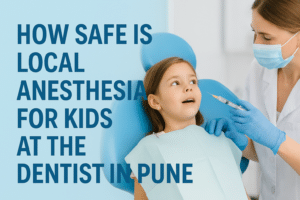
How Safe Is Local Anesthesia for Kids at the Dentist in Pune
A visit to the dentist can feel overwhelming for children—and, let’s admit it, sometimes even for their parents. But with the evolution of pediatric dentistry,

How to Make Brushing Fun and Easy for Your Kids
As parents, ensuring your child maintains good oral hygiene habits can sometimes feel like a daunting task. But what if brushing teeth could become a fun and engaging part of your child’s daily routine?



